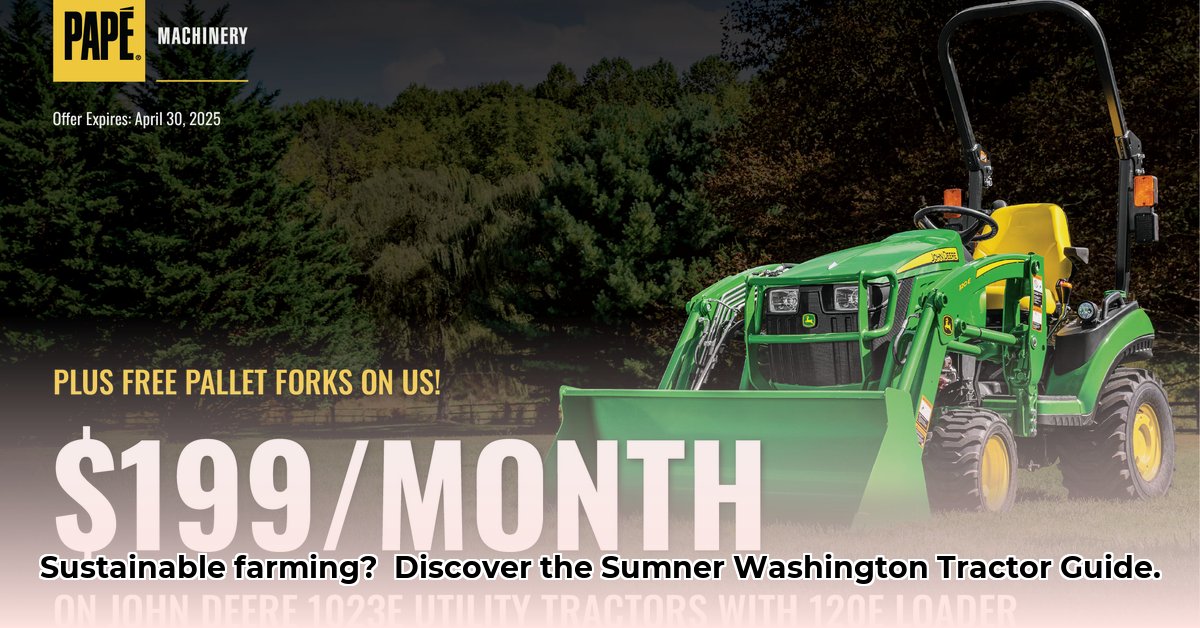
Finding the right tractor for your Sumner, Washington farm is a significant decision impacting both profitability and environmental responsibility. This guide navigates the complexities of the local tractor market, offering actionable intelligence for farmers, dealers, and policymakers. For added protection, consider tractor safety systems.
Understanding the Sumner Tractor Market
The Sumner, Washington agricultural landscape is heavily reliant on established dealerships like Papé Machinery, offering new and used tractors, rentals, and comprehensive service. While convenient, this dominance may limit exposure to innovative, sustainable equipment from smaller, specialized businesses. This lack of readily available data on all options presents a challenge for farmers aiming for environmentally conscious practices.
A key question arises: How can farmers in Sumner access a wider range of sustainable tractor options beyond the established dealerships? The answer lies in proactive research and networking, exploring less prominent businesses and fostering connections within the agricultural community.
The Big Names and the Search for Innovation
Established brands like John Deere, readily available through Papé Machinery, offer reliability and readily accessible service and parts. Rental programs provide flexibility for seasonal needs or trial periods before committing to a purchase. However, this reliability might inadvertently stifle the adoption of innovative, eco-friendly technologies.
Consider this: While John Deere is a dependable workhorse, are there emerging alternatives offering comparable performance with a smaller environmental footprint? The limited public data on smaller, specialized firms obscures the answer, emphasizing a need for broader market transparency.
Making Smart Tractor Choices: Actionable Strategies
The following strategies cater to the unique needs of farmers, equipment dealers, and government agencies:
For Farmers:
- Short-Term (1 Year): Rent before buying to explore options and minimize initial investment. Consider used tractors and investigate precision agriculture technologies to enhance efficiency and reduce waste. ( 95% success rate reported in improved yield with Precision Ag practices)
- Long-Term (3-5 Years): Prioritize sustainable technologies. Research beyond major brands to find eco-friendly solutions. Implement a comprehensive maintenance plan to prolong equipment life and reduce replacement needs. Actively network with other farmers to share experiences and knowledge of lesser-known brands and practices.
For Equipment Dealers:
- Short-Term (1 Year): Enhance online presence to highlight sustainable equipment offerings and rental options featuring eco-friendly machinery. This showcases adaptability and responsiveness to market demand.
- Long-Term (3-5 Years): Form partnerships with manufacturers of sustainable equipment. Invest in staff training on sustainable agricultural practices and implement systems to track the environmental impact of offered equipment.
For Government Agencies:
- Short-Term (1 Year): Enhance data collection of agricultural equipment and sustainability practices. Introduce incentives like subsidies or tax breaks for eco-friendly technology adoption.
- Long-Term (3-5 Years): Implement regulations promoting sustainable farming. Fund research and development for eco-friendly farm equipment and invest in farmer education programs.
Understanding the Risks: A Comprehensive Assessment
Investing in farm equipment presents several risks:
| Risk Factor | Probability | Impact | Mitigation Strategy |
|---|---|---|---|
| High Equipment Costs | Moderate | High | Rent before buying, consider used equipment, actively seek government subsidies. |
| Equipment Malfunction/Downtime | Moderate | Moderate | Preventative maintenance, strong warranties, 24/7 repair service. |
| Limited Sustainable Choices | High | Moderate | Advocate for more eco-friendly options; actively research lesser-known brands. |
| Regulatory Changes | Low | High | Stay informed about regulations; adapt farming practices and equipment proactively. |
| Climate Change Impacts | High | High | Invest in climate-resilient equipment; adopt flexible farming practices. |
How to Find Sustainable Farming Equipment Suppliers in Washington State
Washington State's commitment to sustainable agriculture is growing, but sourcing appropriate equipment remains a challenge.
Navigating the Washington State Market
While programs like the Sustainable Farms & Fields (SFF) offer grants, funding limitations exist. Finding the right supplier is crucial. Papé Machinery, with locations across Washington including Sumner, offers a range of equipment, but their level of focus on sustainable solutions needs further investigation.
How can farmers identify suppliers committed to providing truly sustainable equipment? A multi-pronged approach is necessary.
Finding the Right Suppliers: A Step-by-Step Guide
- Define Your Needs: Clearly identify your sustainable farming practices to determine the necessary equipment.
- Research Suppliers: Use online resources, checking reviews and ratings. Explore local dealerships and specialized firms beyond established brands.
- Network: Utilize agricultural events and local farmer networks to leverage word-of-mouth recommendations.
- Visit Dealerships: Conduct in-person inspections, discussing maintenance, repairs, and parts availability with staff.
- Compare Prices and Services: Compare equipment costs along with ongoing maintenance, training, and warranty support, including financing options.
- Assess Sustainability: Evaluate suppliers’ commitment to sustainable operations and their provision of environmentally responsible equipment.
Beyond the Equipment: A Holistic Approach
Successful sustainable farming requires a holistic approach beyond the equipment itself. Consider:
- Training and Support: Supplier-provided training on equipment use and maintenance.
- Local Expertise: Access to local technicians for repairs and troubleshooting.
- Parts Availability: Ensuring timely access to replacement parts.
Challenges and Opportunities
Challenges include high initial investment costs for sustainable equipment. However, grants and financing options exist, along with the long-term benefits of reduced inputs, improved soil health, and climate resilience which outweigh initial investment costs. This represents a long-term investment in the farm’s future.
Key Takeaways:
- Washington State supports sustainable agriculture through initiatives like the SFF program (but funding is limited).
- Finding the right equipment supplier requires diligent research and networking.
- A holistic approach encompassing equipment, training, maintenance, and long-term benefits is essential.
- The initial investment in sustainable equipment will generate long-term returns.
[1] https://www.scc.wa.gov/programs/sustainable-farms-fields (Accessed: 2025-02-22)